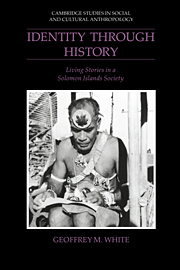Book contents
- Frontmatter
- Contents
- List of illustrations
- Preface
- Acknowledgments
- Orthography
- 1 Introduction
- I ORIENTING
- II TRANSFORMING
- III NARRATING
- 7 Becoming Christian: playing with history
- 8 Missionary encounters: narrating the self
- IV REVITALIZING
- Notes
- References
- Index
- Cambridge Studies in Social and Cultural Anthropology
7 - Becoming Christian: playing with history
Published online by Cambridge University Press: 12 January 2010
- Frontmatter
- Contents
- List of illustrations
- Preface
- Acknowledgments
- Orthography
- 1 Introduction
- I ORIENTING
- II TRANSFORMING
- III NARRATING
- 7 Becoming Christian: playing with history
- 8 Missionary encounters: narrating the self
- IV REVITALIZING
- Notes
- References
- Index
- Cambridge Studies in Social and Cultural Anthropology
Summary
On Maré, legend and even history are beginning to replace mythology.
Maurice Leenhardt, Do Kamo (p. 119)Even though the social and ceremonial order instituted by Christianity has been in place for over seventy years, people young and old continue to locate themselves in the “new life” and to conceive of their identity in terms associated with oppositions of “old” and “new,” heathen and Christian. Although the meaning and valorization of these categories is variable, they are repeatedly deployed in conversations and narratives in which people create reflexive images of who they are, where they've been, and where they are going. These oppositions persist not because they express timeless meanings but, to the contrary, because they may be adapted to changing circumstances, to the tasks of articulating identity and experience in small communities caught up in world events.
During the era of conversion to Christianity, and continuing today, Santa Isabel people have expressed desires to revitalize society in stories and symbols that contrast the “new” Christian life of the present with the “old” life of the past. The retelling of stories about raiding and kidnapping such as those told by James Nidi and Christian Odi represent the Maringe past as one of vulnerability, violence and victimization.
- Type
- Chapter
- Information
- Identity through HistoryLiving Stories in a Solomon Islands Society, pp. 133 - 156Publisher: Cambridge University PressPrint publication year: 1991



